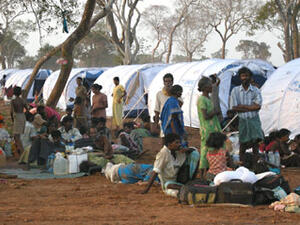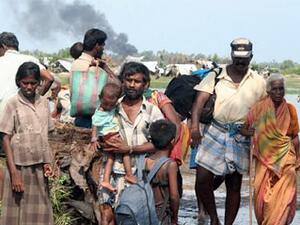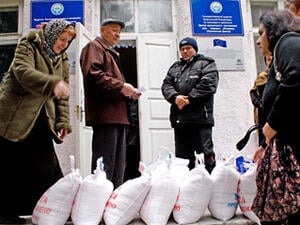F1 racer experiences fast-track documentation for displaced Colombians
F1 racer experiences fast-track documentation for displaced Colombians
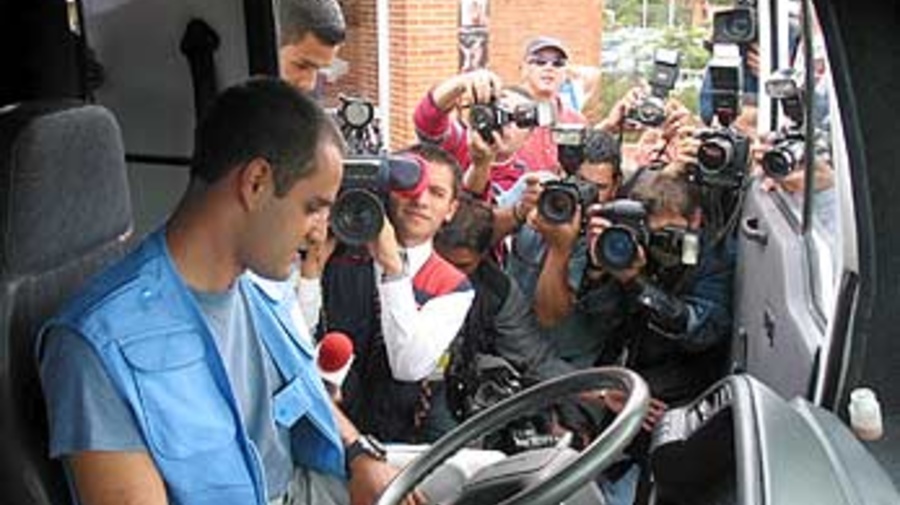
Colombian Formula 1 racing driver Juan Pablo Montoya at the wheel of UNHCR's mobile documentation unit in Bogotá.
BOGOTA, Colombia, August 13 (UNHCR) - Top Formula 1 racing driver Juan Pablo Montoya sat at the wheel of a vehicle very different from those he normally drives - a van specially designed to bring fast-track documentation to internally displaced persons (IDPs) and other vulnerable people in the most remote areas of Colombia.
The Colombian racing driver, who works with the United Nations to help Colombians affected by four decades of internal conflict, was in Bogota last week to participate in an exhibition of some key UN programmes. It was there that he was introduced to the documentation mobile unit, a key component of a joint project between the UN refugee agency and Colombia's Registry Office that has brought documents to more than 160,000 Colombians since 2000.
Montoya witnessed what the mobile unit could do when he went through the documentation process and obtained his ID card in the vehicle. However, he is not the typical target of such campaigns, which are aimed at IDPs and communities at risk, many of whom are subsistence farmers and indigenous people.
Some of them have never had documentation. Others lost theirs while fleeing the fighting between various armed groups.
"Documents are key in the emergency and the post emergency periods," explained Ana Julieta Arguelles, UNHCR's co-ordinator for the project. "During emergencies, internally displaced people need ID documents if they want to request support from the government - food and money to pay rent. But having documents is also a must when it comes to durable solutions. For example, the campaign has helped IDPs to have access to special housing projects designed for them."
Presenting Montoya with his ID card was one way to celebrate the documentation campaign's achievements: More than 60,000 people have benefited so far in 2003, breaking the mark set the previous year.
The documentation project launched in 2000 has allowed UNHCR to deal with the complexities of internal displacement in a country where laws and government institutions are in place to handle humanitarian issues, but whose capacities do not match the magnitude of their mission. According to humanitarian organisations, an estimated 50 percent of Colombians who were displaced in 2002 did not receive any government assistance.
UNHCR's partner, the National Registry Office, is legally responsible for providing identity documents for Colombians, but often lacks the means to do so efficiently beyond the main cities, or even in the poor areas outside the heart of those cities. That was the case in Buenaventura, Colombia's most important port, where a massive campaign filled a gap in documentation among IDPs and vulnerable populations in places far from the city centre, where the influence of guerrilla and paramilitaries is evident.
Under the project, displaced people can complete the whole application process in the mobile unit without having to leave their settlement. The vehicle is equipped to carry out fingerprinting and collection of personal data and to take photos to be used on the ID cards. The local health department performs the required blood typing. After all the information is sent in, the National Registry Office gives priority processing to the applications from the displaced people and provides them with the actual documents in just two months, compared to the usual six to eight months.
Not all campaigns are carried out by land. To reach remote communities, registration teams sometimes have to rely on boats and even canoes.
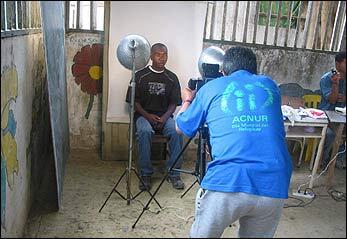
The UNHCR-funded campaign documents displaced Colombians in Las Mercedes, a forgotten fishing town on the Pacific coast that is accessible only by boat.
Documentation campaigns are about to stop for this year, as there will be elections in October and UNHCR wants to emphasise the non-electoral nature of its work.
There have been 27 documentation campaigns so far in 2003, one for as few as 50 people in the Urabá region, another for more than 18,000 in Buenaventura. Particular needs vary from place to place, but the general need for the documentation effort remains high in the country. The fact that the government acknowledged 100,000 new internally displaced persons in the first half of this year suggests that many more Colombians will need UNHCR's help to get documents so that they can protect their rights amid what has been described as "the most severe humanitarian crisis in the western hemisphere".
By Gustavo Valdivieso
UNHCR Colombia





